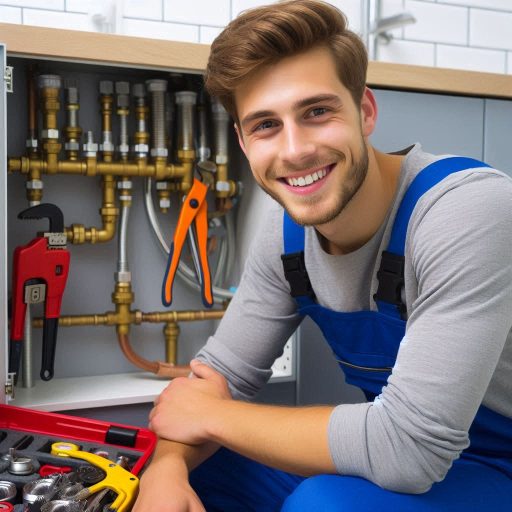Introduction
In the dynamic landscape of professions, embracing eco-friendly practices is paramount, and plumbing is no exception.
The importance of sustainability resonates across industries, influencing the choices we make to preserve our environment.
In this blog post, we delve into the realm of eco-friendly plumbing practices, with a specific focus on their significance and implementation in the United Kingdom.
From cutting-edge technologies to mindful material choices, the UK plumbing industry is at the forefront of embracing practices that minimize environmental impact.
Join us as we explore innovative solutions and the pivotal role plumbers play in promoting sustainability, contributing to a greener future for the UK.
The significance of eco-friendly plumbing
Eco-friendly plumbing practices have gained significant importance in recent years, primarily due to growing concerns about the environment and the need for sustainable living.
Traditional plumbing practices, while effective in providing water and sanitation, often have a considerable environmental impact.
By understanding the significance of eco-friendly plumbing, we can take steps towards a more sustainable future.
The environmental impact of traditional plumbing practices
One of the major environmental impacts of traditional plumbing practices is water wastage.
Many traditional plumbing systems use outdated fixtures that consume excessive amounts of water.
This leads to unnecessary water consumption, placing a strain on local water sources.
Additionally, water wastage contributes to the depletion of freshwater resources, which are already scarce in many regions.
Eco-friendly plumbing tackles this issue by utilizing low-flow fixtures and efficient irrigation systems.
Low-flow fixtures, such as low-flow toilets and aerated faucets, reduce water consumption without compromising functionality.
These fixtures use less water per flush or minute, resulting in significant water savings over time.
Personalized UK Career Consulting
Receive tailored career guidance designed just for you. Get actionable steps and expert support to boost your career in 1-3 days. Take control of your career now.
Get StartedEfficient irrigation systems, such as drip irrigation, ensure that water is delivered directly to plants’ roots, minimizing water loss through evaporation or runoff.
How eco-friendly plumbing can help conserve water and energy
Energy conservation is another crucial aspect of eco-friendly plumbing.
Traditional plumbing systems often rely on energy-intensive practices, such as maintaining large water heaters and powering inefficient appliances.
This leads to unnecessary energy consumption, which contributes to greenhouse gas emissions and accelerates climate change.
Eco-friendly plumbing addresses these concerns by promoting energy-efficient alternatives.
Tankless water heaters, for example, heat water on-demand instead of constantly storing hot water, reducing energy waste.
Energy-efficient appliances, such as washing machines and dishwashers with high energy ratings, consume less electricity and water while still providing excellent performance.
By adopting these eco-friendly plumbing practices, homeowners can significantly reduce their energy consumption and environmental impact.
Benefits for both the environment and homeowners
The benefits of eco-friendly plumbing extend beyond the environment and affect homeowners directly.
Implementing eco-friendly plumbing practices can lead to considerable cost savings.
By conserving water and energy, homeowners can reduce their utility bills, saving money in the long run.
Additionally, many governments and organizations offer incentives and rebates for implementing eco-friendly plumbing, further offsetting the initial costs.
Furthermore, eco-friendly plumbing can improve the overall value and attractiveness of a property.
As more people become environmentally conscious, homes equipped with eco-friendly plumbing features become more desirable in the real estate market.
Your Dream Job Starts with a Perfect CV
Get a tailored CV and cover letter that captures your unique strengths and stands out in your industry. Let us help you make an unforgettable first impression.
Get StartedAdditionally, eco-friendly plumbing practices promote healthier living environments by reducing the risk of water pollution and improving indoor air quality.
Therefore, eco-friendly plumbing practices play a crucial role in mitigating the environmental impact of traditional plumbing systems.
By conserving water and energy, these practices contribute to the preservation of natural resources and reduction of carbon emissions.
Homeowners can benefit from reduced utility bills and increased property value by implementing these eco-friendly measures.
In our collective effort to create a sustainable future, adopting eco-friendly plumbing practices is an essential step forward.
Read: The Role of Tech in Modern UK Plumbing
Understanding eco-friendly plumbing
Definition of what eco-friendly plumbing entails
- Eco-friendly plumbing is a set of practices that aim to reduce water waste and conserve energy.
- It involves using sustainable materials, water-efficient fixtures, and energy-saving technologies.
- The main goal is to minimize the negative impact on the environment while maintaining plumbing functionality.
- Eco-friendly plumbing also focuses on reducing the use of harmful chemicals in plumbing systems.
- It promotes environmentally conscious water management through techniques like rainwater harvesting and greywater recycling.
- Overall, eco-friendly plumbing prioritizes sustainability and aims to create a greener and more efficient plumbing system.
The principles and strategies used in eco-friendly plumbing.
- Water conservation: Eco-friendly plumbing uses strategies to minimize water consumption in residential and commercial buildings.
- Leak detection: Regular inspections and maintenance are carried out to identify and fix leaks promptly, saving water and preventing damage.
- Efficient fixtures: Installation of low-flow showerheads, faucets, and toilets reduces water usage without compromising performance.
- Greywater recycling: Water from sinks, showers, and laundry can be recycled and reused for non-potable purposes, reducing reliance on freshwater sources.
- Rainwater harvesting: Collecting and storing rainwater for irrigation and toilet flushing reduces demand for treated water.
- Energy efficiency: Eco-friendly plumbing incorporates energy-saving technologies like insulated pipes, on-demand hot water systems, and efficient water heaters.
- Proper disposal: Environmentally friendly plumbing emphasizes proper disposal of wastewater and sewage to avoid contamination of water sources.
- Use of non-toxic materials: Eco-friendly plumbing promotes the use of non-toxic materials, such as lead-free pipes and fittings, to ensure water quality.
- Education and awareness: Promoting water conservation and sustainable plumbing practices through educational campaigns and public awareness initiatives.
- Collaboration: Eco-friendly plumbing involves partnerships between plumbers, manufacturers, and government bodies to develop and promote eco-friendly solutions.
The use of sustainable materials, water-efficient fixtures, and energy-saving technologies.
- Sustainable materials: Eco-friendly plumbing utilizes materials like bamboo, recycled steel, and cast iron pipes made from recycled metal.
- Water-efficient fixtures: Low-flow toilets, aerated faucets, and showerheads with flow restrictors help conserve water without sacrificing comfort.
- Dual-flush toilets offer different flushing options for solid and liquid waste, further reducing water usage.
- Energy-saving technologies: Tankless water heaters, heat pump water heaters, and solar water heating systems minimize energy consumption.
- Insulated pipes prevent heat loss during water distribution, reducing the need for heating.
- Smart plumbing systems with sensors and programmable settings optimize water usage and prevent leaks.
- Greywater recycling systems treat and store wastewater for non-potable purposes, such as toilet flushing and landscape irrigation.
- Rainwater harvesting systems collect rainwater from rooftops and store it for later use, reducing reliance on municipal water supplies.
Read: Finding a Reliable Plumber in the UK

Legislation and regulations promoting eco-friendly plumbing in the UK
When it comes to eco-friendly plumbing practices, the UK has implemented several laws and regulations to ensure the adoption of sustainable plumbing practices.
These regulations not only encourage environmentally friendly methods but also provide incentives and certifications for plumbers who adhere to these practices.
Overview of relevant laws and regulations in the UK
- The Water Supply (Water Fittings) Regulations 1999: This legislation sets the standards for the design, installation, and maintenance of plumbing systems.
- The Environment Agency’s Water Efficiency (WAT-RM-040) Standard: This standard promotes water-efficient fittings and appliances to reduce water wastage.
- The Building Regulations 2010: Part G – Sanitation, hot water safety, and water efficiency focus on sustainable plumbing practices in new constructions.
- The Energy Performance Certificates (EPC): While not specific to plumbing, EPCs highlight the energy efficiency of a building, encouraging the use of eco-friendly systems.
Encouraging the adoption of eco-friendly plumbing practices
These regulations have a significant impact on encouraging the use of eco-friendly plumbing practices in the UK.
They promote water conservation, energy efficiency, and overall sustainability.
By incorporating these practices, the UK aims to minimize the environmental impact and create a more sustainable future.
The Water Supply (Water Fittings) Regulations 1999 ensure that plumbing systems are designed and installed to prevent water wastage, leakage, and contamination.
This regulation promotes the use of water-efficient appliances, such as low-flow toilets and aerated faucets, which help reduce water consumption.
Optimize Your LinkedIn for Success
Boost your LinkedIn profile with a professional bio, keyword-rich headline, and strategic recommendations that attract recruiters. Stand out from the crowd and get noticed.
Optimize NowThe Environment Agency’s Water Efficiency Standard focuses on increasing water efficiency in buildings.
It encourages the use of rainwater harvesting systems, greywater recycling, and water-efficient fixtures.
These measures not only conserve water but also lower water bills for consumers.
Part G of the Building Regulations 2010 emphasizes the need for sustainable plumbing practices in new constructions.
It sets standards for water usage, drainage, and hot water safety.
By adhering to these regulations, plumbers contribute to reducing environmental impact and ensuring the long-term sustainability of buildings.
Incentives and certifications for eco-friendly plumbers
The UK offers various incentives and certifications for plumbers who adopt eco-friendly practices.
The WaterSafe certification is one such program that aims to promote competent and qualified plumbers who prioritize water safety and conservation.
Plumbers with this certification adhere to high standards and are recognized for their expertise in eco-friendly plumbing practices.
Furthermore, the UK government provides financial incentives to homeowners and businesses to encourage the use of eco-friendly plumbing systems.
These incentives include grants for installing rainwater harvesting systems, greywater recycling systems, and energy-efficient boilers.
By offering such incentives, the government actively encourages the adoption of sustainable plumbing practices.
In fact, the UK’s legislation and regulations play a vital role in promoting eco-friendly plumbing practices.
Through standards, certifications, and incentives, the UK strives to create a sustainable future by reducing water wastage, promoting energy efficiency, and ensuring overall ecological responsibility.
Read: Essential Safety Tips for UK Plumbers
Eco-friendly plumbing techniques and best practices in the UK
When it comes to sustainable living, every aspect of our daily routines can make a difference.
From conserving water to reducing energy consumption, eco-friendly plumbing practices play a crucial role in protecting the environment and lowering our carbon footprint.
In the United Kingdom, there are several techniques and best practices that can be implemented to achieve a more sustainable plumbing system.
Water conservation methods
- Low-flow fixtures: Installing low-flow faucets, showerheads, and toilets can significantly reduce water consumption.
- Greywater recycling: Treating and reusing wastewater from showers, bathtubs, and sinks for non-potable purposes minimizes water wastage.
- Dual-flush toilets: Utilizing toilets with dual-flush options allows users to control the amount of water used per flush.
- Rainwater harvesting: Collecting rainwater through catchment systems can be used for irrigation or toilet flushing, reducing the reliance on treated water.
Implementing these water conservation methods not only helps preserve this valuable resource but also reduces water bills for homeowners.
Proper insulation and leak detection
- Insulation: Adequate insulation of pipes prevents heat loss, ensures hot water stays hot, and minimizes energy wastage.
- Leak detection: Regularly inspecting plumbing systems for leaks helps identify and fix issues promptly, preventing water wastage and potential damage.
- Smart leak detectors: Installing smart leak detection systems enables real-time monitoring and alerts homeowners in case of leaks or abnormal water usage.
- Efficient irrigation systems: Using drip irrigation or smart sprinkler systems ensures water is delivered directly to plants, avoiding unnecessary wastage.
By prioritizing insulation and leak detection, households can not only save water but also reduce energy consumption related to heating water and repairing pipe damage.
Renewable energy sources for heating systems
- Solar-powered water heaters: Utilizing solar energy to heat water significantly reduces reliance on fossil fuels and lowers carbon emissions.
- Heat pumps: Ground-source or air-source heat pumps can efficiently provide hot water by utilizing renewable energy from the environment.
- Biomass boilers: Bioenergy from sustainably sourced wood pellets can be used to power boilers for heating water or central heating systems.
Adopting renewable energy sources for heating systems is not only environmentally friendly but also helps homeowners save on energy bills in the long run.
Incorporating eco-friendly plumbing practices in the UK is essential for sustainable living and preserving natural resources.
By implementing water conservation methods, ensuring proper insulation and leak detection, and utilizing renewable energy sources for heating systems, individuals can contribute to a greener future while reducing utility costs.
It is crucial for both homeowners and plumbing professionals to embrace these techniques and best practices to create a more sustainable society.
Read: Plumbing Regulations in the UK Simplified
Case studies: Successful eco-friendly plumbing projects in the UK
When it comes to eco-friendly plumbing practices, the UK has taken significant steps to implement sustainable solutions in various projects.
Let’s take a look at some successful case studies that showcase the positive impacts of these initiatives on the environment and homeowners.
Retrofitting water-efficient fixtures in residential buildings
- Water-efficient fixtures like low-flow toilets and faucets were installed in a housing development.
- This led to a substantial reduction in water consumption, contributing to the conservation of this precious resource.
- The homeowners also benefited from reduced water bills, promoting sustainable living.
- Challenges faced during implementation included financing and retrofitting old plumbing systems.
- This was overcome by offering grants and incentives to homeowners and encouraging them to embrace eco-friendly practices.
Rainwater harvesting systems in commercial buildings
- Commercial buildings in urban areas were equipped with rainwater harvesting systems.
- These systems collected rainwater from rooftops and stored it for non-potable uses like toilet flushing and irrigation.
- As a result, the demand for treated water decreased, reducing the strain on the municipal water supply.
- Additionally, the installation of these systems contributed to reducing flood risks by effectively managing rainwater runoff.
- The main challenge encountered was the limited space available for installing the necessary infrastructure.
- However, creative solutions like underground storage tanks were utilized to overcome this constraint.
Ground source heat pumps in new construction projects
- Newly constructed buildings were equipped with ground source heat pumps for their heating and cooling needs.
- These pumps utilize the stable temperature of the ground to efficiently heat or cool the building.
- By reducing reliance on traditional heating and cooling systems, carbon emissions are significantly reduced.
- Homeowners also benefit from lower energy bills and a more comfortable indoor environment.
- The challenge faced during implementation was the initial investment cost of installing the ground source heat pumps.
- To overcome this, financial incentives and subsidies were provided, making it an attractive option for builders and homeowners.
Greywater recycling systems in educational institutions
- Greywater recycling systems were implemented in schools and colleges to reuse wastewater generated from handwashing and showers.
- The treated greywater was then utilized for flushing toilets and irrigation purposes.
- This reduced the demand for freshwater and minimized the strain on sewage treatment plants.
- Educational institutions also used this as an opportunity to educate students about water conservation.
- Overcoming the challenge of integrating these systems into existing infrastructure required careful planning and retrofitting.
- With proper coordination and expertise, the implementation was successful.
These case studies demonstrate the successful implementation of eco-friendly plumbing practices in the UK and their positive impacts on the environment and homeowners.
By sharing such examples, we can inspire more initiatives and encourage individuals, businesses, and institutions to adopt sustainable plumbing solutions.
The role of eco-friendly plumbing in sustainable living
When it comes to sustainable living, eco-friendly plumbing plays a crucial role.
It is not just about conserving water or reducing energy consumption; it goes beyond that.
Eco-friendly plumbing practices have a direct connection to overall sustainability and can greatly impact our environment in a positive way.
By opting for eco-friendly plumbing systems, we can contribute to a significant reduction in our carbon footprint.
Water heating, for example, accounts for a large portion of energy consumption in households.
By using energy-efficient water heaters or solar-powered systems, we can considerably reduce our energy use and emissions.
Water conservation is another vital aspect of eco-friendly plumbing.
Traditional plumbing systems often consume excessive amounts of water due to leaks, inefficient fixtures, or outdated technology.
However, by embracing eco-friendly plumbing practices such as installing low-flow fixtures or using dual-flush toilets, we can substantially reduce our water usage.
Furthermore, eco-friendly plumbing not only helps in conserving natural resources but also in preserving our water supply.
Freshwater is a finite resource, and it is essential that we use it wisely.
By implementing water-saving techniques like rainwater harvesting or gray water recycling, we can reduce our reliance on municipal water sources and ensure their long-term sustainability.
Encourage readers to consider eco-friendly plumbing when undertaking renovations or new construction projects
When undertaking renovations or new construction projects, it is crucial to consider eco-friendly plumbing options.
By doing so, we can not only minimize the negative impact on the environment but also save money in the long run.
Firstly, eco-friendly plumbing systems often come with energy-saving features that can significantly reduce utility bills.
Tankless water heaters, for example, only heat water as needed, eliminating the standby energy losses associated with traditional storage tank systems.
Secondly, the use of water-efficient fixtures can lead to substantial water savings over time.
These fixtures, such as low-flow showerheads and faucets, restrict water flow without compromising performance, thereby reducing water waste and lowering water bills.
Lastly, eco-friendly plumbing options are designed to be durable and long-lasting.
Choosing high-quality, sustainable materials not only reduces maintenance costs but also minimizes the need for frequent repairs or replacements.
By adopting eco-friendly plumbing practices, we can contribute to a more sustainable future for both ourselves and the planet.
So, the next time you plan a renovation or construction project, consider incorporating eco-friendly plumbing solutions to make a positive impact on the environment while enjoying the long-term benefits it offers.
Conclusion
Eco-friendly plumbing practices in the UK are essential for preserving the environment and ensuring a sustainable future.
By adopting these practices, we can significantly reduce water and energy waste, minimize pollution, and protect our natural resources.
It is crucial for everyone to support eco-friendly plumbers who prioritize these practices.
By choosing such professionals, we contribute to the wider adoption of sustainable plumbing solutions, creating a positive impact on the environment.
To learn more about eco-friendly plumbing practices in the UK, you can explore the following resources:
Waterwise – A leading authority on water efficiency in the UK, offering valuable information on eco-friendly plumbing.
Chartered Institute of Plumbing and Heating Engineering – Provides educational materials, guidelines, and resources on sustainable plumbing practices in the UK.
The Green Age – Offers comprehensive guides and tips on eco-friendly plumbing, helping you make informed choices for your home.
By taking the initiative to understand and implement eco-friendly plumbing practices, we contribute to a more sustainable and healthier environment for ourselves and future generations.
[E-Book for Sale]
500 Cutting-Edge Tech Startup Ideas for 2024 & 2025: Innovate, Create, Dominate
$19.99 • 500 Tech Startup Ideas • 62 pages
You will get inspired with 500 innovative tech startup ideas for 2024 and 2025, complete with concise descriptions to help you kickstart your entrepreneurial journey in AI, Blockchain, IoT, Fintech, and AR/VR.




